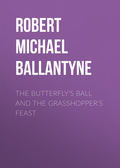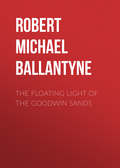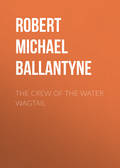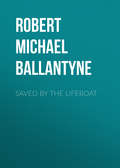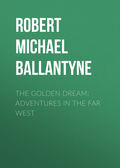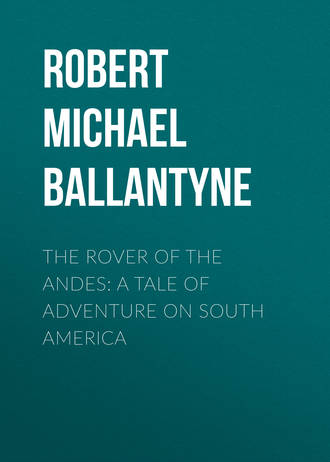
Robert Michael Ballantyne
The Rover of the Andes: A Tale of Adventure on South America
Chapter Twenty Seven.
Describes several Interesting and somewhat Violent Proceedings
Over the flowering plains! Oh, there is something soul-stirring in a free, furious, prolonged gallop, where obstructions are few, where the land is almost level, and Nature reigns unfettered by the influence of man! No fences, no ditches, no ploughed lands, no enclosed estates, nothing to check even for a moment the grand onward sweep through illimitable space save the capacity of endurance in steed and rider.
Of course it has its drawbacks, but we will not pause to meditate on these. Life has its drawbacks everywhere, and if we were to attempt an enumeration of them our tale would become unreasonably long, and also somewhat unprofitable.
Perhaps it adds to the zest of life the fact that many of its incidents are of such a nature that we find it difficult to say whether they are drawbacks or advantages. For instance, the jovial garrulity of Quashy was a drawback at times. At other times it was a decided advantage, and his friends and companions held such interchangeable opinions on the point that they could not readily have expressed them if called on to do so at a moment’s notice.
A runaway tendency in a horse is considered by most people a disadvantage. Yet there are some people whose nerves and spirits are so constituted that they have a sneaking fondness for a horse of this disposition.
Strange though it may seem, Manuela belonged to this class. It is said that men whose characters form a contrast are more likely to draw towards each other than those whose characters are similar. May the same principle not operate between man and the lower animals? Was it not the gentleness, tenderness, womanliness, softness of Manuela which caused her to dote upon and delight in her steed, though it was a huge, high stepping, arch-necked, rearing, plunging animal—something between an Irish hunter and a Mexican warhorse?
The steed in question had been purchased for her by her father from the Gauchos, who assured him that the animal was a remarkably good one to go. They told the simple truth, but not the whole truth, for sometimes it would “go” with its hind-legs doing double service in the way of kicking, and, at other times, it balanced that feat by giving its fore-legs a prodigious flourish while in the act of rearing. To do the creature justice, however, it could and did go ahead of its companions on the journey, and retained that position without fatigue, as was evinced by the flashing eye, distended nostril, pawing and snorting with which it received every proposal to halt.
Being a splendid rider, Manuela managed this spanking charger with infinite grace and ease, all the more that it happened to have a tender mouth, and only succeeded in getting beyond her control when it chanced to get the bit between its teeth. At first her father and the others were alarmed, and offered to change her steed for another; but she refused to change, and when they saw how fearlessly she rode, they became reconciled—all except Lawrence.
“It is the fearlessness of innocence combined with ignorance,” he muttered to himself one afternoon, as Manuela’s horse, without apparent provocation, presented first its tail and then its nose to the sky. The Inca princess patted the playful creature approvingly, and induced it to adopt a bounding, indiarubber-like pace. In a few minutes this was reduced to a springy walk.
Lawrence could not resist the temptation to ride forward and offer his own horse, although Colonel Marchbanks rode alongside of his daughter like an inflexible guardian.
“You will find my horse much easier to manage, Miss Marchbanks,” he said, “and quite as strong and fleet as your own.”
The colonel frowned, and his daughter said, “No, t’ank you, senhor,” with a little bow and a brilliant smile.
It was one of Manuela’s little fancies to revert sometimes to the broken English peculiar to her colour and costume. This was not at all relished by Lawrence. It seemed to argue a want of earnestness, which was not at all in harmony with the tremendous depth of his love for her! He drew rein immediately and fell behind, but at that moment Manuela’s horse put its foot in a biscacho-hole and stumbled. Evidently it had received a violent surprise, for, after having a second time presented its tail and nose alternately to the skies, it gave vent to an indignant snort, performed what seemed to be a pirouette on one leg, took the bit in its teeth, and bolted.
Of course the colonel put spurs to his steed, and gave chase. Instantly Lawrence did the same. As a consequence Quashy followed, and, not wishing to be left behind, the whole cavalcade went after them at full speed. The thunder of numerous hoofs acted as a sharp spur to the wild runaway. At once it became a fair race, in which each gradually took his place according to ability. The course was clear—from the Andes to the Atlantic, almost, and horses and riders were fresh!
In a remarkably short time the party straggled, and the line extended. Soon it became evident that the colonel, Lawrence, Pedro, and Quashy were the best mounted of the troop, for these four drew far ahead of all the others; yet the runaway kept its advantage, despite the utmost efforts of Manuela’s fair little arms to check it. Gradually Pedro and the colonel were left behind. Despite the utmost application of voice and spur, Quashy also dropped to the rear, and the race lay at last between our hero and the Inca princess!
Mile after mile was passed as they flew like the wind over the rolling plains, scarcely impeded at all by the Pampas grass, which was not long at that season, but at last they came to a ridge on which there was a line of low bushes. By that time, by dint of hard spurring, Lawrence had managed to get up almost alongside of the girl, whose look of gleeful excitement was now changed to one of wild anxiety.
“Try to pull just a little harder!” cried Lawrence, “your horse won’t be able to jump it.”
Manuela tried, but she had already put forth all her strength, and if that had been twice what it was, the effect on the powerful creature would probably have been just the same.
As the danger drew nearer, Lawrence made desperate efforts to increase his speed. He was so far successful that when they finally came to the line of bushes, the horses were almost abreast of each other. Horses of the Pampas are not usually jumpers, but Manuela’s horse must have had a touch of the hunter in him, for he rose to the leap, and went up like a rocket. Lawrence, on the other hand, went crashing through the obstruction like the shot of an eighty-ton gun! The leap evidently took more time than the crash, which was fortunate, for it enabled Lawrence to get well alongside at the moment the fore-feet of Manuela’s horse touched the ground, and just as the poor girl herself, unused to leaping, fairly lost her balance as well as her presence of mind and fell backward half fainting. She would have fallen to the ground if Lawrence had not caught her round the waist, and dragged her to the pommel of his own saddle. It was one of those cases of rescue which men are apt—perhaps justifiably so—to style providential, for no planning or judgment or energy on the part of Lawrence could have arranged that Manuela should have been at the apex of her leap when her powers failed, so that she should fall from that height, as it were, almost into his arms!
A few bounds more and they were safe. As if it had understood this, and felt that further effort was needless, the runaway steed stopped abruptly, and, after looking round in unreasonable surprise, began quietly to crop the herbage at its feet.
One by one the rest of the party came up, full of congratulations.
“You dood dat well, massa,” said Quashy, who was the first to arrive, grinning all over; “and dat was a bu’ster,” he added, surveying the gap in the bush through which Lawrence had crashed.
“Please set me down before the others come up!” whispered Manuela, who, having, as we have said, half fainted, had allowed her head to fall on her rescuer’s shoulder.
Lawrence wished that circumstances might have admitted of his continuing the journey as they were then situated, but propriety required him to say—
“Here, Quash,—lend a hand.”
The negro vaulted to the ground, and received Manuela into his arms just as Pedro and the colonel galloped up.
“Thank you, Senhor Armstrong, thank you heartily,” said the latter, as he dismounted, and, sitting down on a mound, drew his child to his side.
“I’m not hurt, not a bit,” sighed Manuela, with a slight attempt at a smile.
“Thank God for that, but you are shaken a little,” returned the old soldier with an anxious look. “Here Pedro, Quashy, fetch me the flask from my saddle.”
By the time a cup of the flask’s contents was administered to Manuela, Mariquita and Susan were kneeling beside her, and the rest were standing round.
“A splendid leap!—aw—couldn’t have been much better done if—aw—it had been an English hunter,” remarked the sportsman in an undertone to his friend. “But, I say, don’t it strike you that the colonel is uncommonly—aw—sweet on that little Indian girl.”
“She’s no more an Indian girl than you are,” replied his friend, with a laugh.
“Aw—you don’t say so?” returned the sportsman, with a slight elevation of his eyebrows.
“Let us go,” said Manuela, rising; “I am much better, only a little shaken by such a leap. But—but I should like another—”
“Yes, to be sure, another horse,” interrupted the colonel; “who will exchange?—a quiet one, of course.”
“Here you is, kurnel,” said Quashy, with a beaming countenance, as he led forward his horse. “Quiet as a lamb, ’cept when you aggrawates him. Nebber goes no faster dan you wants him to,—sometimes not so fast! an’ wouldn’t run away even if you was to ax him on your knees.”
“After such recommendation,” said the colonel, turning to Manuela, “I suppose you will accept of this steed.”
The Inca princess accepted it with a beam of gratitude to Quashy, who thereupon mounted the runaway horse, and in a few minutes the whole cavalcade was sweeping over the plain as swiftly as ever.
Afternoon brought them to a solitary Gaucho hut. They came first upon the corral rather suddenly, for it was concealed in a hollow. It was an enclosure of strong rough posts stuck into the ground, on many of which were perched a number of gorged vultures and hawks.
The ground around it was covered with bones, bullocks’ horns, wool, carcasses of horses, and other refuse, which induced the travellers to keep carefully to windward of it. On a slight rising ground, close at hand, stood the mud hut of the family to which it belonged.
Although living in a state little short of savagery, this family, being descended from one of the best old families of Spain—at least, so they believed—maintained much of the dignity, good manners, and ceremony that characterised the old Spaniards. It comprised several generations, of whom a great-great-grandfather, blind, deaf, and benignant, formed the head, and a baby, fat, wide awake, and uproarious, formed the tail. Between these there was a band of men, women, girls, and boys, whom we will not even attempt to describe, further than to say that they were all black-eyed, sunburnt, and more or less pretty and handsome.
The travellers rode up to the door of the mud mansion, and, according to Pampas etiquette, awaited permission to dismount. This was quickly given with much urbanity by a handsome middle-aged man, who was the active head of the household.
The intention of Colonel Marchbanks was to take a hasty meal here, and push on as far as possible before night. Finding that the Gauchos were engaged at that time in breaking in some young horses, he ordered his party to off-saddle, and went with Pedro, Lawrence, and some others towards the corral while food was being prepared.
Quashy—ever mindful of the welfare of others, and ever thoughtful in regard to what he esteemed the most important things of life—hung behind to advise a daughter of the house to prepare a specially tender fowl for Susan, Manuela, and Mariquita. He even remained a few minutes to receive from the damsel a lesson in cookery.
This daughter of the Pampas whispered something to a very small brother beside her, who was remarkable chiefly for the size of his gorgeous eyes and the scantiness of his costume. With ready obedience the urchin unhooked a miniature lasso from the wall, and lassoed a large hen. How the brother and sister executed that hen was not obvious.
It was, however, quickly and effectively done between them. Then the sister took the bird to a pot of water, which chanced to be boiling at the time, and put it therein, feathers and all. To civilised people this might have seemed rather a savage process, but it was not so. The object was merely to simplify the plucking. After scalding, the feathers came off with wonderful facility, and also stuck to the girl’s wet hands with equally wonderful tenacity. Washing her hands, she next cut off the wings and legs of the fowl, and then separated the breast from the back. These portions she put into a small pot with some suet and water, and threw the rest away.
“Das bery good,” remarked Quashy, nodding his head in approval, after which he advised the girl to treat another fowl or two in a similar manner, and then followed his master to the corral.
Here a very animated scene was being enacted. Half a dozen young horses were about to be mounted for the first time and broken in. What modern horse-trainers of the tender school would have said to the process we cannot tell. Having had no experience in such matters, one way or another, we hazard no opinion. We merely state the facts of the case.
The father of the family, mounted on a strong and steady horse, commenced the business by riding into the corral, and throwing his lasso over the head of a young horse, which he dragged forcibly to the gate. Every step of the process was forcible. There was nothing equivalent to solicitation or inducement from beginning to end. Opposition, dogged and dire, was assumed as a matter of course, and was met by compulsion more dogged and more dire!
At the gate of the corral the end of the lasso was received by the eldest son of the family, a tall, strapping, and exceedingly handsome youth, of about twenty-three, who had been named Pizarro,—no doubt after the conqueror of Peru. He certainly resembled his namesake in courage, vigour, and perseverance, if in nothing else. The young horse displayed great unwillingness at first to quit its companions,—shaking its magnificent mane, and flourishing its voluminous tail in wild disdain as it was dragged out.
But the moment it found itself outside the corral, its first idea was to gallop away. A jerk of the lasso checked him effectually. Another member of the household then deftly threw his lasso in such a manner that the prancing steed put its feet in it, and was caught just above the fetlocks. With a powerful twitch of this second lasso its legs were pulled from under it, and it fell with tremendous violence on its side. Before it could rise the young Gaucho forced its head to the ground and held it there, then drew his long knife, and therewith, in a few seconds, cut off its mane. Another Gaucho performed the same operation on the hair of its tail—both acts being done, as they explained, to indicate that the horse had been once mounted.
Meanwhile Pizarro quickly put a strong hide halter on the animal’s head, and a piece of hide in his mouth to serve as a bit. He also girthed a saddle on him, and, when all was ready, ordered the men who held him to let go. At the same moment he sprang into the saddle and held on.
Holding on was the point on which Pizarro had to concentrate all his attention and power during the next few minutes, for the way in which that outraged and intensely fierce creature strove to unseat him is alike beyond the power of description and conception. Jumping, plunging, kicking, rearing, bounding, and pirouetting are all sufficiently expressive terms in their way, but they are mild words with which to describe the proceedings of that creature of the Pampas while under the influence of temporary insanity. With ears flat on its neck, nostrils distended, and eyes emitting something almost like flames, the young horse absolutely screamed in its fury; but all was in vain. As well might it have tried to shake off its own tail as Pizarro!
Suddenly it changed its plan, and stretched out its sinewy length to its longest stride. Pizarro fell in with the idea, encouraged it with his long sharp spurs and heavy lash, and away they went over the mighty plain like a streak of personified lightning.
It is useful sometimes to let wilful people not only have their way, but compel them to continue it. John Gilpin’s spirit, when he said—
“’Twas for your pleasure you came here;
You shall go back for mine.”
is not unknown on the Pampas and the prairie:
After sailing away over the plain, like a ship going out to sea, until it was a mere speck on the horizon, Pizarro’s horse thought it time to reduce its pace; but here Pizarro did not agree with it. He applied whip and spur until his steed was quite exhausted. Then he turned homewards, and galloped back to the corral, into which he turned the animal in a very broken and humble state of mind. There it found several young friends who had just been subdued in a similar manner, and it is not altogether improbable that they spent the remainder of that evening in comparing notes!
“A roughish method, but—aw—effective,” remarked the sportsman to his friend.
This was true. Perhaps Quashy’s remark to Lawrence was equally true:—
“Dat dood it pritty slick, massa; but I’ve seed it as well dood, p’r’aps better, by kindness.”
There is this, at all events, to be said in regard to the rough system, that no man but an athlete could endure the fatigue of the process, while any man—or even woman—has physical strength sufficient to conquer by love, if only he, or she, possess the requisite patience and milk of human kindness.
Chapter Twenty Eight.
Treats of a Gaucho Youth
From these Gauchos Colonel Marchbanks learned that his troops had been seen searching for him by the eldest son, Pizarro, and that handsome youth professed himself willing to guide the party to the place where the soldiers were likely to be found. Without delay, therefore, they resumed their journey after supper, and that night encamped on the open plain.
While the party was busy making arrangements for the night, Pedro sauntered to the top of a neighbouring knoll to have what he styled a look round.
It was a clear moonlight night, and Lawrence, recognising the figure of the guide, followed him.
“Pedro,” he said, on overtaking him, “how is it possible that Pizarro can guide us to where the troops are, seeing that it is some time since he saw them, and he did not know in what direction they meant to travel? Besides, they may have changed their intentions and their route several times.”
“You forget, senhor, that troops leave a broad trail, and you do not yet, I see, fully appreciate the wonderful powers of some Gauchos in tracking out men. This Pizarro, although so young, is already celebrated in that way.”
“You know him, then? Why, you seem to know everybody!”
“I know every one of note,” replied the guide, “for my travels have been extensive, and my memory is pretty strong. Let me give you one or two instances of Pizarro’s powers. I was in this part of the country two years ago. Having occasion to pass this way, I fell in with Pizarro, and we travelled together a short time. One forenoon we were riding over the plains, when he stopped suddenly, pointed to a footprint, and said, ‘That is the little grey horse that was stolen from my father three years ago!’ ‘Are you sure?’ said I, almost laughing at him. ‘Sure!’ said he, ‘of course I am; moreover, I’m certain that the horse passed here not more than half an hour ago.’ ‘Let’s follow it up, then,’ said I, more in jest than earnest. But we did follow it up, and recovered the little grey horse that same evening.”
“A wonderful power of observation indeed, as well as memory,” said Lawrence, looking with increased interest at the young Gaucho, who could be seen, by the light of the neighbouring camp-fire, moving about in a graceful, free and easy manner, assisting in the preparation of supper.
“It was pretty well in its way,” returned Pedro, “but he did a sharper thing than that last year. A gold escort was attacked somewhere in the west, and the robbers, after killing most of the men, escaped with the bags of gold. The authorities being very anxious to trace out and punish the robbers, offered a high reward for any useful information as to their whereabouts. Now it chanced that Pizarro was moving about the country at that time, and, hearing of the adventure and the reward, kept his eyes open and his wits about him a little more sharply than usual—though he does that pretty well at all times by nature. One day he saw a little child leading a mule laden with raw hides along a narrow path. This is a common enough sight, in no way calculated to attract particular attention; nevertheless it did attract the attention of Pizarro. I don’t pretend to understand the workings of a Gaucho’s mind. Perhaps it was the extreme smallness of the child that struck him, causing him to think that as no father or mother would risk such a little thing with the charge of a loaded mule without a special reason, it would be as well to find out what that special reason might be. Perhaps it was something else. Anyhow, suspicion being awakened, he followed the mule for a short distance, and soon observed that it stepped as if it carried a much heavier weight than a mere pack of hides. At once the stolen gold flashed into Pizarro’s mind. He stopped the mule, cut the bandages off the hides, and there, concealed among them, found the stolen bags!”
“After that,” said Lawrence, “I have no doubt whatever that he will soon find the troops.”
“Neither have I,” returned Pedro; “but Pizarro, and men like him, can do much more than I have told you. By a flight of birds they can tell of an approaching band of men before they are in sight, and by the cloud of dust they make when they appear they can form a close estimate of their numbers. When the Indian hordes are about to make a raid, Gauchos are warned of it by the ostriches and llamas and other timid beasts of the Pampas all travelling in one direction, and in many other ways that seem little short of miraculous they act the part of wilderness-detectives.”
While continuing their journey next day, Lawrence resolved to have a chat with the Gaucho youth. Riding up alongside, he saluted him, and received a reply and a graceful bow that would have done credit to a Spanish grandee. He discovered ere long that the young man’s mind, like his body, had been cast in a noble mould, and that, although ignorant of almost everything beyond his own wild plains, he was deeply imbued with reverence for Truth and Justice in all the relations of life. Indeed, his sense of these attributes of God was so strong that the constant violation of them by those around him roused in him occasional bursts of hot indignation, as Lawrence very soon found when he touched on a recent revolution which had taken place in the province of San Juan.
“Are the troops we search for sent out to aid the government of Mendoza?” demanded Pizarro, turning an earnest and frowning glance on his companion.
“I believe not,” answered Lawrence; “at least I have not heard the colonel talk of such an object; but I am not in his confidence, and know nothing of his plans.”
Pizarro made no rejoinder, and Lawrence, seeing by the continued frown that the youth’s spirit was somewhat stirred, sought for further information by asking about Mendoza.
“Do you not know,” said the Gaucho, with increased vehemence, and a good deal of fine action, “that the people of San Juan have deposed their governor, because he is a bad man?”
“I had not heard of it,” said Lawrence, “but what has that to do with Mendoza?”
“You shall hear, senhor. The governor of San Juan is dishonest. He is bad in every way, and in league with the priests to rob the people. His insolence became so great lately that, as I have said, the people arose, asserted their rights, and deposed him. Then the government of Mendoza sent troops to reinstate the governor of San Juan; but they have not yet succeeded! What right,” continued the youth, with grand indignation,—“What right has the government of Mendoza to interfere? Is not the province of San Juan as free to elect its own governor as the province of Mendoza? Have its men not brains enough to work out their own affairs?—ay, and they have arms strong enough to defend their rights, as the troops shall find when they try to force on the people a governor of whom they do not approve.”
Lawrence felt at once that he was in the presence of one of those strong, untameable spirits, of which the world has all too few, whose love of truth and fair-play becomes, as it were, a master-passion, and around whom cluster not only many of the world’s good men, but—unfortunately for the success of the good cause—also multitudes of the lower dregs of the world’s wickedness, not because these dregs sympathise with truth and justice, but simply because truth-lovers are sometimes unavoidably arrayed against “the powers that be.”
“I don’t know the merits of the case to which you refer,” said Lawrence, “but I have the strongest sympathy with those who fight or suffer in the cause of fair-play—for those who wish to ‘do to others as they would have others do to them.’ Do the people of San Luis sympathise with those of San Juan?”
“I know not, senhor, I have never been to San Luis.”
As the town referred to lay at a comparatively short distance from the other, Lawrence was much surprised by this reply, but his surprise was still further increased when he found that the handsome Gaucho had never seen any of the towns in regard to which his sense of justice had been so strongly stirred!
“Where were you born, Pizarro?” he asked.
“In the hut where you found me, senhor.”
“And you have never been to Mendoza or San Juan?”
“No, senhor, I have never seen a town or a village—never gone beyond the plains where we now ride.”
“How old are you, Pizarro?”
“I do not know, senhor.”
As the youth said this with a slightly confused look, Lawrence forbore to put any more personal questions, and confined his conversation to general topics; but he could not help wondering at this specimen of grand and apparently noble manhood, who could neither read nor write, who knew next to nothing of the great world beyond his own Pampas, and who had not even seen a collection of huts sufficiently large to merit the name of village. He could, however, admirably discern the signs of the wilderness around him, as he showed by suddenly pointing to the sky and exclaiming—
“See! there is a lion!”
“Lions have not wings, Pizarro,” said Lawrence, with a smile, as he looked upward; “but I see, very high in the air, a flock of vultures.”
“Just so, senhor, and you observe that they do not move, but are hovering over one spot?”
“Yes, I see that; what then?”
“A lion is there, senhor, devouring the carcass from which he has driven the vultures away.”
In a short time the correctness of the youth’s observation was proved by the party coming upon, and driving away, a puma which had previously disturbed the vultures at their banquet on the carcass of an unfortunate ox.
The next morning Pizarro’s capacity for tracking the wilderness was proved by the party coming on the broad trail of the troops. Soon afterwards they discovered the men themselves taking their midday siesta.
Not long after that the united party came within scent of the Atlantic, and on the afternoon of the same day galloped into the town of Buenos Ayres.



